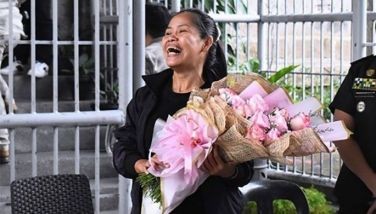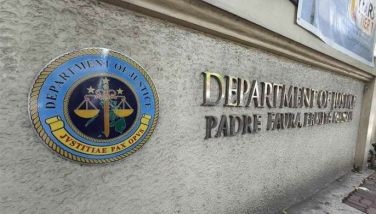Locals rally round disease-hit British farmers
NORMANDY (AFP) - For the village at the heart of Britain's foot and mouth scare, these are dark days. But as the outside world watches anxiously and waits, locals are rallying round to protect their own.
And for the people of Surrey, where a third suspected outbreak of the potentially devastating disease was found Wednesday, one of the ways they can show support for crisis-hit farmers is to keep buying their products.
"It's probably just brought the community closer together," said Sue Keeble, manager of the Duke of Normandy pub in the tiny settlement of that name where the first outbreak was confirmed on a local farm last Friday.
Locals are naturally a bit more "downbeat," she said, but they are certainly not changing their eating habits. "They're not bothered. They're saying we will keep on eating beef," she said.
You could understand if they would have second thoughts: the village is barely a few minutes' drive from the Pirbright vaccine research centre, from where the foot and mouth disease is suspected to have leaked.
But the story is similar in other nearby towns and villages, where life goes on as normal despite the huge attention on whether the outbreaks here will herald a repeat of a devastating 2001 epidemic which wracked the whole country.
In Dorking, a pretty rural town 18 miles (29 kilometres) away, local farmers were out as usual selling burgers, sausages and chops at a weekly market in a car park behind the town's church.
Some reported slightly slower than usual trade, although those snapping up the prime cuts were clear that the meat was safe and the farmers deserved their support.
Niall Crawley-Moore said he had had a steady stream of customers asking him how he was handling the situation.
"Most of the people who come to a farmers' market are intelligent enough to realise that there's nothing actually wrong with the meat that I'm selling or that everybody else is selling," he said.
"We have had a few people from a couple of farm shops that we supply who have had customers going in and saying 'is the meat safe to eat?' They haven't got enough information and people are prone to panic about things".
At the other end of the market, Robyn Aldrick, 50, whose partner is a farmer in the next county, was manning a stall and reported that "people don't seem scared of buying".
"They just say 'we feel really sorry for you' because this is our livelihood. All we basically do is farmers' markets plus some private sales from our newsletter," she said.
A similar market in Guildford, the nearest major town to the outbreak, was cancelled Tuesday because of foot and mouth, she added.
Shopper Shena Sanders, originally from Sydney, Australia, but now living in Reigate, Surrey, said she relished being able to buy direct from producers and said any health risk was outweighed by the benefits.
"My husband is wanting me to be more careful but my feeling is that farmers are not going to sell you things that they think are dodgy at all -- they're going to be careful," the actress said.
Support was, though, less clear cut outside the giant Tesco supermarket on the outskirts of Guildford.
While many said the situation would not blunt their taste for red meat, a few suggested it could, particularly after earlier animal health scares such as bird flu earlier this year and the 2001 foot and mouth outbreak.
Charlotte Heslop, a 20-year-old teaching assistant, was among those expressing doubts.
She said she was normally a vegetarian but was currently eating meat on medical advice because she was anaemic. "I think definitely my family are all not feeling so likely to want to eat meat," she said.
"It's quite a good excuse for me not to eat meat. I feel that I definitely am less comfortable with the fact that I'm being told to".
The communities caught up at the centre of the crisis were, though, bulwarks of support for the farmers.
Christine Musser, the vicar of Pirbright -- home of the laboratory site almost certain to be the source of the virus -- said that while there was "dismay and concern", local people would carry on as before.
And back in Normandy, where warning signs pepper farms, fields and footpaths, the message is definitely "business as usual" as far as diners facing roast beef lunch in the village pub are concerned.
"They're not going to turn away from it," said Keeble.
- Latest
- Trending





























